Column: Do California hotel workers deserve extra job security? They think so
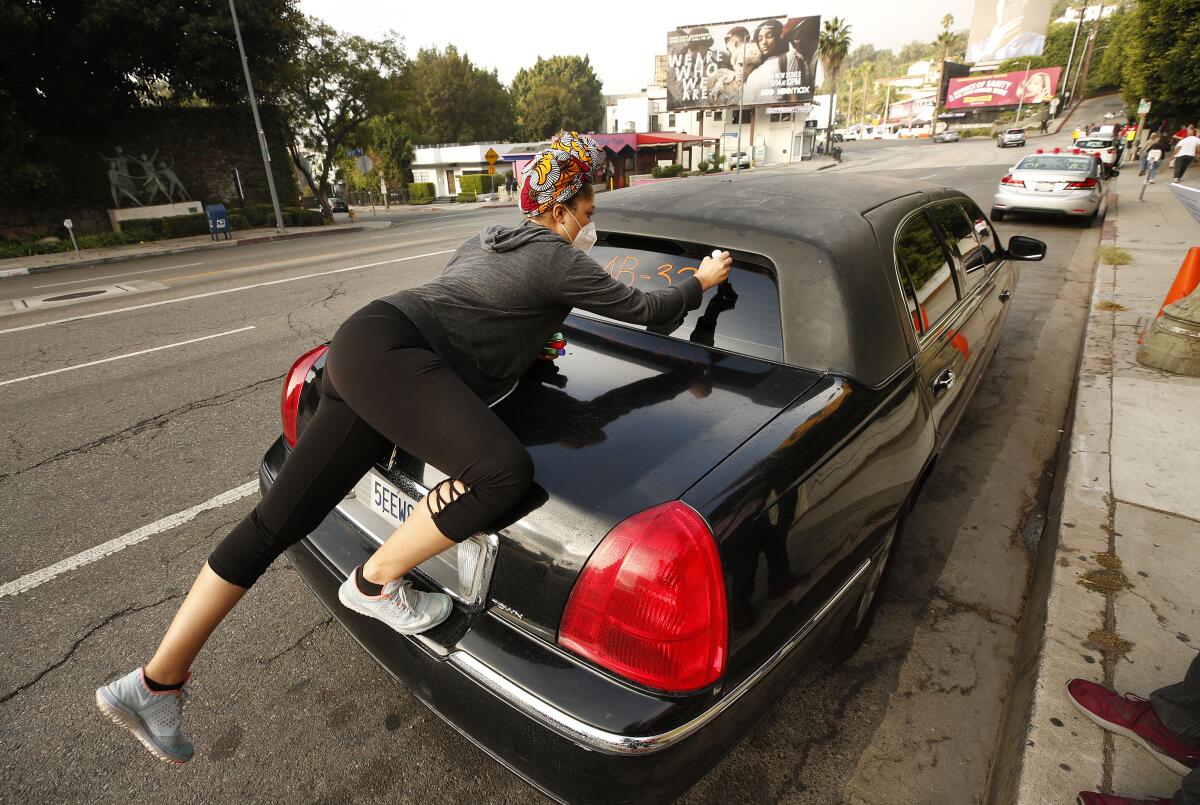
Bleary-eyed and snack-deprived, I stumbled toward Terminal A at John Wayne Airport at 5:30 in the morning.
It was a ritual I practiced at least once a month before the coronavirus, my runway of choice to seek stories across the country.
This time, the final destination was closer: the Chateau Marmont in Los Angeles.
A group of laid-off airport and hotel employees were going to hold a rally at John Wayne, then visit the legendary Sunset Strip hotel where John Belushi died to meet their unemployed peers. Afterward, some planned to caravan to Sacramento and demand a meeting with Gov. Gavin Newsom.
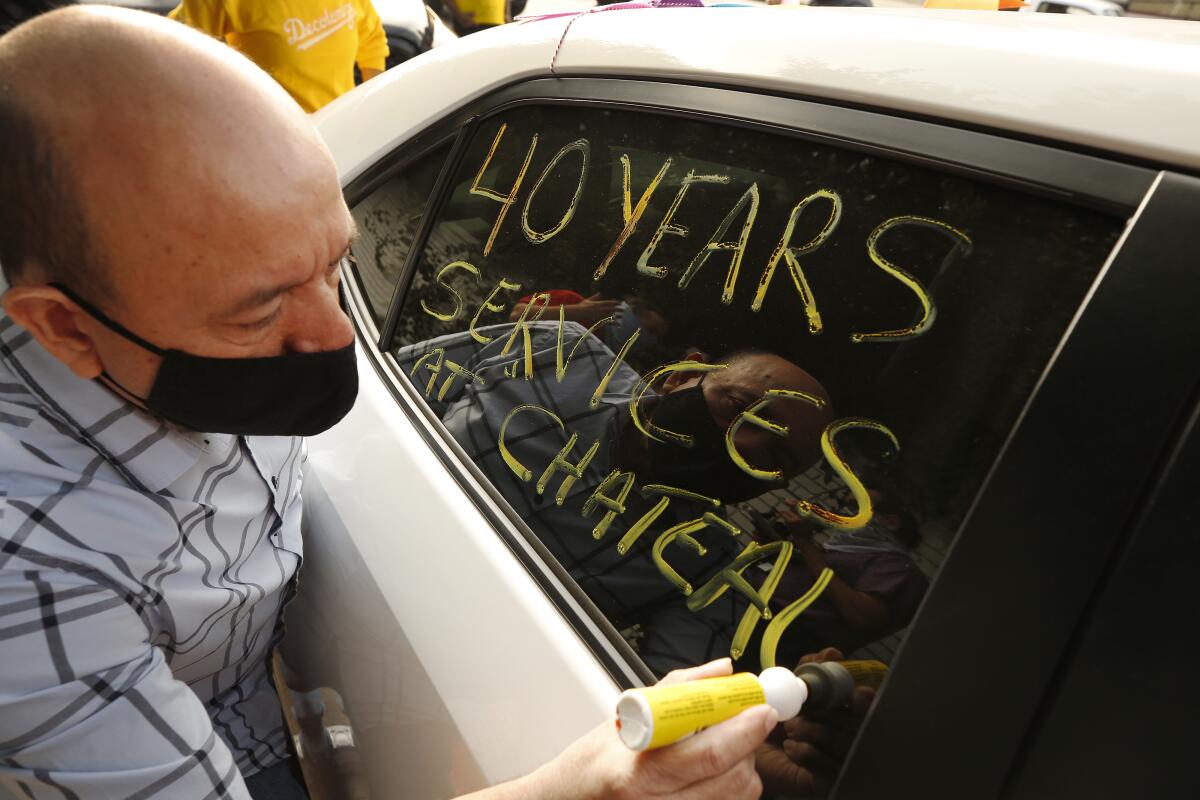
They were upset he has yet to sign AB 3216, which would pin a right-to-return policy on the hospitality industry. Basically, anyone who lost their jobs at hotels, airports and private clubs during this pandemic and any future “state of emergency” can get their position back based on seniority once normal returns — whenever that is.
I was there to ask workers one question: Out of all lost jobs in the Golden State, why did theirs deserve special protection? What about the rest of the working class?
John Wayne Airport was eerily slow when I showed up. Nearby hotels — usually lit up before dawn like checkerboards — were almost completely dark. The traffic that usually snarls the small airport was nonexistent. It was so quiet that activists with Unite Here Local 11, the union that represents more than 30,000 hospitality workers across Southern California and Arizona, parked in loading zones to decorate their cars with signs — and no one complained.
At least for a while.
Joyce Swaving, a 67-year-old Aliso Viejo resident, held a sign that read, “No Insurance in the Middle of a Pandemic,” which caught the eye of Unite Here researcher Jonah Breslau. He flipped the sign over so it read “Recall Airport Workers.”
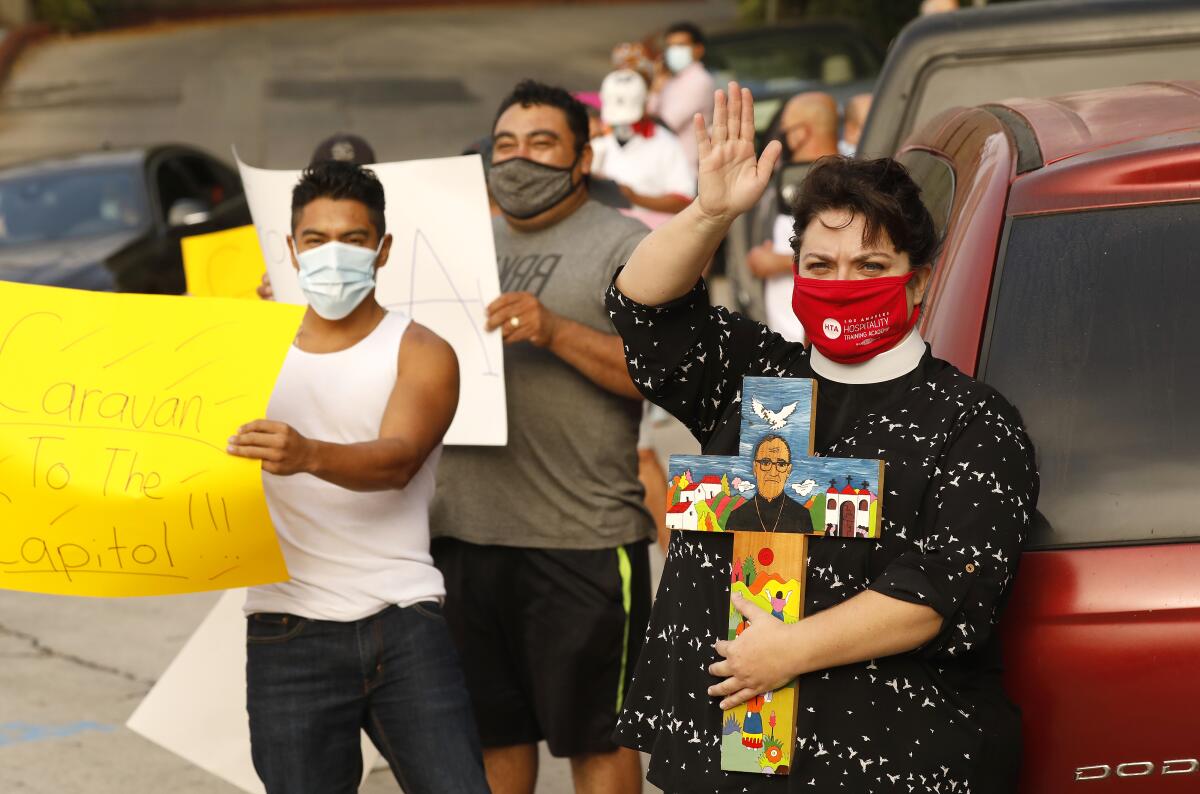
“Let’s not get the message confused,” he told Swaving. “As it is, people think AB 3216 is some exercise supplement.”
As it was, no one at John Wayne Airport seemed to care.
The 20 or so protesters who showed up outnumbered travelers about 4 to 1. The few people flying out that morning were too focused on lugging suitcases to notice anything else.
Unite Here 11 co-President Ada Briceño told me that California’s multibillion-dollar hospitality industry had a moral obligation to rehire its workers.
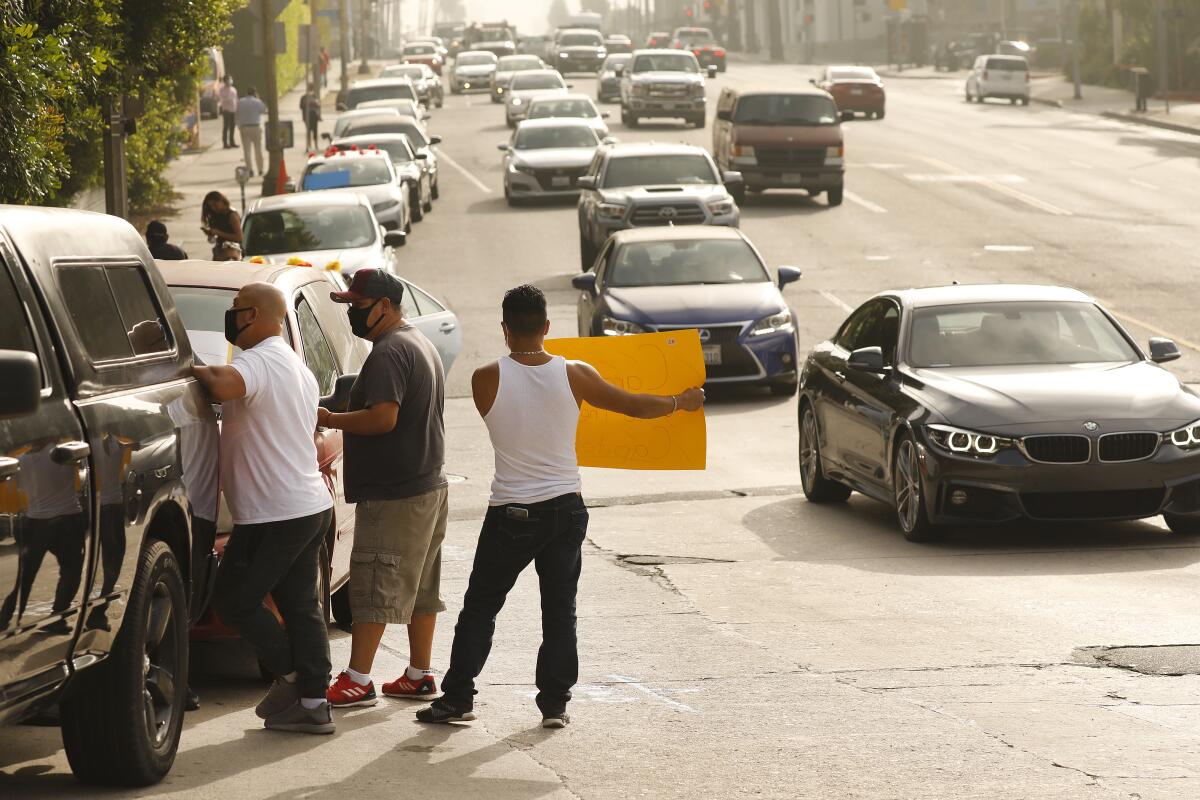
“We know what’s going to happen,” said Briceño, who also heads the Democratic Party of Orange County. “We saw it after 9/11. We saw it after the Great Recession. They’ll lay off people, then rehire younger and cheaper. The hotels will recover, but what about people who gave years to them?”
Suddenly, a deep voice asked, “Did you guys pull a permit?”
Tall and taciturn like the airport’s namesake, Orange County Sheriff’s Deputy Robert Witteman wore the look of an annoyed neighbor after kids trampled his lawn. Again.
He told the cars to skedaddle, which they were already going to do because their protest was about to start.
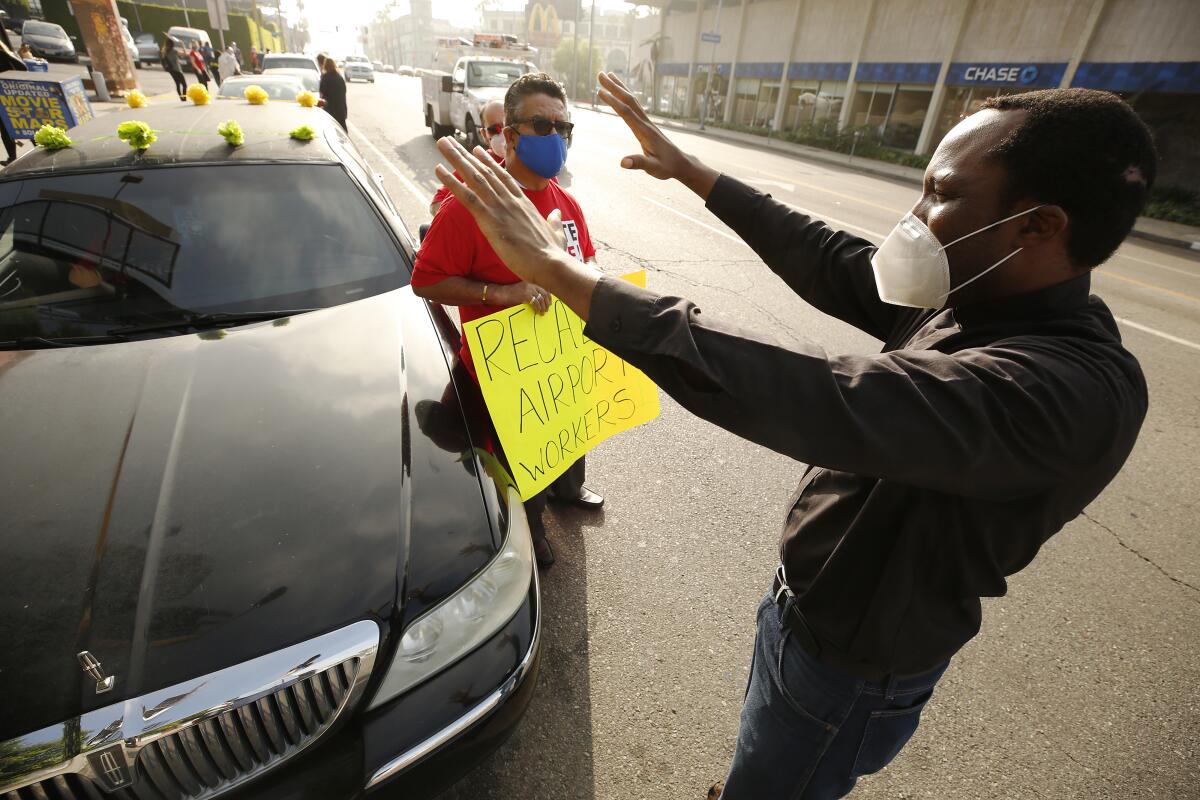
Everyone put on their hazard lights and pumped their hands on the horn as they began to cruise around the airport a tad slower than the posted 10-mph speed limit.
I weaved into their mini-convoy to see what might happen. A View-Master slideshow played out every time we passed by Terminal A.
The small Unite Here crowd cheered us on. Click.
Another deputy joined Witteman. Click.
Then five. Click.
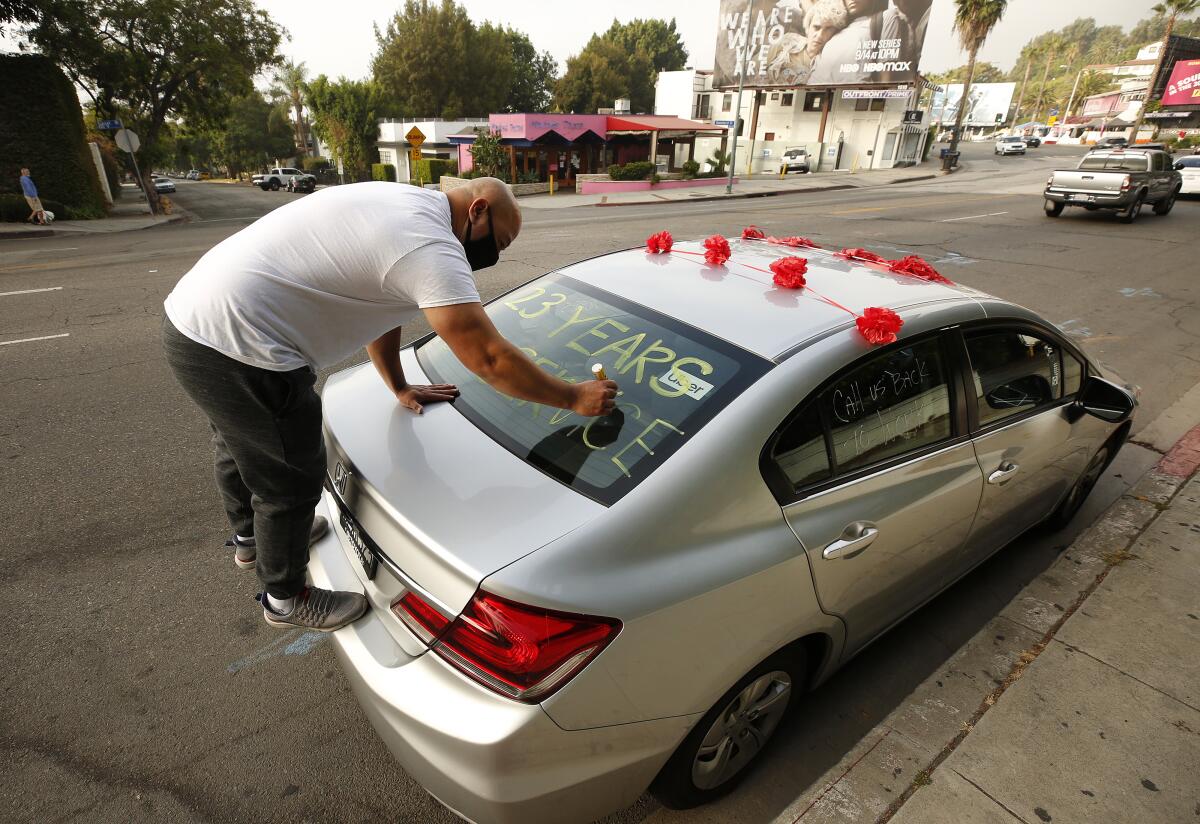
A Sheriff’s Department SUV showed up with flashing lights. Click.
The SUV joined the drive-by rally and pulled an organizer over. Click.
Briceño called later to say that the deputies threatened to give everyone a ticket for not pulling the permit and for honking too much, but let the group off with a warning.
I say she called me later because I didn’t stick around. As soon as I saw Orange County Johnny Law pull the organizer to the curb, I tapped on the gas and made my getaway.
***
I still wasn’t convinced about AB 3216 as Waze told me a zigzag through Koreatown was the fastest way to Chateau Marmont.
The cynic in me knew the only reason the bill was getting so much play was because its backers included the media-savvy Unite Here and political powerhouses — and former union organizers — like Assemblywoman Lorena Gonzalez (D-San Diego) and state Sen. Maria Elena Durazo (D-Los Angeles).
But even though the California hospitality industry is in a free fall, it has received tens of millions of dollars in federal Paycheck Protection Program loans. For this and other reasons, they have a fighting chance.
Their former employees? Not so much.
When we think of hospitality workers ... we really don’t. Our focus is on rest and relaxation when we travel, not the help. Or we imagine jovial Hollywood stock characters who have few worries and meet their Prince Charming while emptying trash cans.
We don’t think about the longtimers: overwhelmingly middle-aged and immigrant.
People like Walter Almendarez. He worked as a bellman for 23 years at the Chateau Marmont before it closed down in March. The owner plans to reopen it as a private club with far fewer workers.
“How is it you’re going to run me away like that?” said the Salvadoran immigrant, as someone chalked “Gov. Newsom Hear Our Stories” on his car. Nearby, Francisco Santos nodded.
“It’s been a golden opportunity for them to get rid of us,” said the 63-year-old, who worked as a cook at the Terranea Resort in Rancho Palos Verdes for eight years.
“We don’t want handouts,“ said 62-year-old Carlos Barrera of Santa Clarita. The Guatemalan native lost his job as a Chateau Marmont valet just after celebrating 40 years there. “That’s why the bill is important. I understand there’s no work right now, but give us some hope.”
Even workers who would find themselves at disadvantage if AB 3216 became law sympathized with their older comrades.
“I have a lot of respect for people who have worked 30, 40 years,” said Keisha Banks, who worked in catering and events at Chateau Marmont for only a year. “The company doesn’t. These people who gave most of their lives to the company were let go the same way I was let go — with an email.”
“Our society discriminates against older people,” said 43-year-old Paramount resident Yesenia Garcia, formerly of the Langham Huntington hotel in Pasadena. “They’ll see their resume and think, ‘Dishwasher for 20 years? That’s nothing.’ And that’s not fair. It’s important for me to get my job, but what about them?”
Despite this despair, the mood was markedly different from John Wayne Airport. It was hopeful.
A line of cars parked in a red zone in front of the Chateau Marmont, and no cop ever came by. Commuters honked in support and even slowed down to ask how they could help.
A pastor, a rabbi and a Jesuit — not the beginning of a joke, I promise — offered blessings in their respective faith traditions, along with a secular “Sí se puede!”
“Hospitality is a sacred act,” said Pastor Bridie Roberts of Hollywood United Methodist Church. “Think about the stories from the Gospel — the breaking of bread. The search for lodging in Bethlehem. These workers are ‘the least of these’ right now, so we need to champion them.”
A seven-hour drive awaited. Twelve cars, including a limousine with “25 Years Experience” on its side window, took off around 9 a.m.
As we went our separate ways, I thanked them for their hospitality. Someone should, at long last.
A $10 tip left under dirty linens just isn’t enough anymore.
More to Read
Sign up for Essential California
The most important California stories and recommendations in your inbox every morning.
You may occasionally receive promotional content from the Los Angeles Times.











